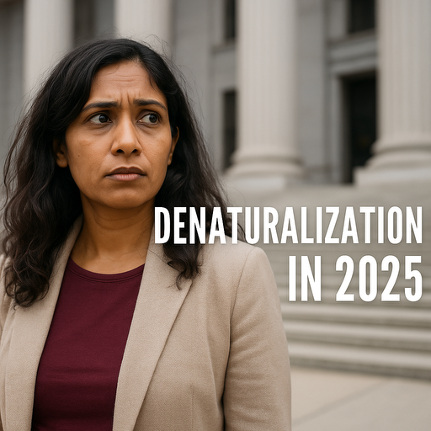Denaturalization in 2025: What Immigrants and Advocates Need to Know

Introduction: A Chilling Shift in Citizenship Policy
In a move drawing concern from immigration lawyers and civil liberties advocates alike, the Department of Justice (DOJ) recently announced that denaturalization—the process of stripping individuals of their U.S. citizenship—will be a top enforcement priority under the current administration.
While denaturalization has long existed as a legal tool for extreme cases (such as war crimes or fraud), its expanded use under the Trump administration signals a dangerous departure from past practice and a potential threat to due process and civil stability.
What Is Denaturalization?
Denaturalization is the legal process of revoking U.S. citizenship from a naturalized citizen. It can occur via:
- Civil litigation filed by the DOJ in federal court, or
- Criminal proceedings when naturalization fraud is prosecuted under 18 U.S.C. § 1425.
The government must prove its case with “clear, unequivocal, and convincing evidence”—a high legal standard, but one that’s now being applied more broadly.
What Grounds Can the Government Use to Denaturalize Someone?
Under the law (8 U.S.C. § 1451), denaturalization is only permitted when:
- Citizenship was obtained through fraud or material misrepresentation.
- The person joined subversive groups (e.g., communists or anarchists) within 5 years of naturalization.
- The person’s citizenship was derived from a parent or spouse whose own naturalization was revoked.
- The individual committed naturalization fraud and was convicted in criminal court.
- Citizenship was granted through military service but the person was later dishonorably discharged.
- The person refused to testify before Congress about subversive activities.
What’s New—and Why It’s Troubling
A June 2025 DOJ memo has broadened the categories of individuals prioritized for denaturalization, now including:
- Anyone DOJ deems “sufficiently important to pursue.”
- Those with pending criminal charges—even without a conviction.
- Individuals accused of financial fraud, corruption, or affiliations with gangs.
- Citizens considered a “potential danger to national security”—a vague term with no clear definition.
These vague priorities open the door for politicized targeting and potentially unconstitutional enforcement.
What Are the Risks to Naturalized Citizens?
The consequences of this policy shift are significant:
- Citizens may be investigated based on minor administrative errors, such as typos on forms.
- Civil denaturalization proceedings offer no right to a public defender.
- Cases can be filed and adjudicated without the individual’s knowledge.
- Once denaturalized, individuals can become stateless, losing the right to work, travel, or receive public benefits.
Can U.S.-Born Citizens Be Stripped of Citizenship?
Rarely. U.S.-born citizens are protected by the Fourteenth Amendment, and denaturalization is not applicable. However, expatriation—the loss of citizenship through certain voluntary acts—can apply, but only under limited and clearly defined circumstances. The government must prove such acts were done voluntarily and intentionally.
Legal Precedent Supports Citizenship Security
The Supreme Court has historically limited government power to revoke citizenship:
- Trop v. Dulles (1958): Denaturalization as punishment violates constitutional protections.
- Afroyim v. Rusk (1967): Citizens cannot be involuntarily stripped of citizenship.
- Schneiderman v. United States (1943): Citizenship should not depend on political pressures or “the temper of majority thought.”
What Immigrants Should Do Now
If you are a naturalized U.S. citizen:
- Ensure your immigration history and application records are accurate and complete.
- Keep copies of all your naturalization paperwork.
- Avoid disclosing personal information on public platforms that may be misconstrued.
- Contact an immigration attorney if you have concerns about prior filings or alleged misrepresentations.
Conclusion: Citizenship Should Be Final
Weaponizing denaturalization undermines public trust in the immigration system and chills civic participation by immigrants. Citizenship is not conditional—it is a legal status granted through a solemn oath and governed by the Constitution and federal statute.
Our firm stands ready to defend your rights. If you believe you may be at risk of denaturalization or have received a notice from USCIS or DOJ regarding your citizenship, please contact us immediately.




